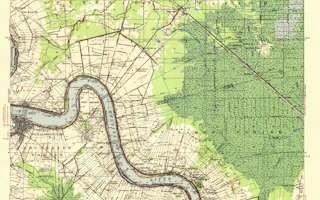

Community Atlas
Burnside
Burnside is an unincorporated community located in Ascension Parish. In its position right along the Mississippi River, Ascension Parish demonstrates the switch from a plantation economy to industrial manufacturing. In the early 1980s, hazardous waste was becoming more of a concern, and Louisiana led the nation in hazardous waste production (Houck 2012). California based company I.T. Corp. was invited by the state to conduct a “feasibility study” to determine the best way to manage the hazardous waste issue (Louisiana Environmental Lawyer 2004).
Burnside residents Theresa Robert and Ruby Cointment became concerned when the company proposed to build the largest hazardous waste landfill in the world within a mile of the community, and within two miles of a predominantly African-American grade school (Houck 2012). Archaeologists and United Houma Nation members later testified that the proposed site was once a historic 18th century Great Houmas Indian village where various artifacts and dwellings had been found (State Times 1988).
Theresa Robert and Ruby Cointment worked with Willie Fontenot and formed Save Ourselves. The group and other Ascension Parish residents went to public hearings and testified about the devastation I.T. Corp. would bring on the community. Eventually, Save Ourselves, along with their attorney Steve Irving, would go on to fight both I.T. Corp and the Environmental Control Commission (ECC) in the Louisiana courts (Houck 2012).
Louisiana Supreme Court Justice James Dennis was responsible for drafting the opinion. Dennis found that the ECC had failed to do its due diligence when it issued I.T. Corps’s permit and it was actually the ECC that had violated the law. I.T. Corp requested new hearings and in 1986, they were scheduled. At that point, Dr. Paul Templet was the secretary of the Department of Environmental Quality. After reviewing the evidence and records Templet denied the permit (Houck 2012).
The I.T. Decision changed the way public input is utilized in project proposals. The courts interpreted the decision to require a “five-step inquiry” into project proposals, which led to other victories for community members and environmental groups. Though the court did not deny I.T. Corp. the ability to create the landfill, it gave the people of Burnside (and all Louisiana residents) the opportunity to test and review proposals (Houck 2012). The proposed site for the I.T. hazardous waste facility is now a residential development named Pelican Point.

